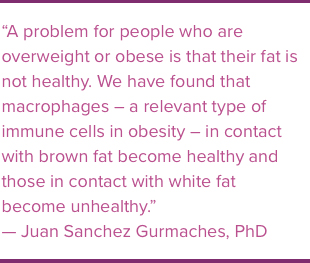Fat Cell Research Explores Underlying Causes of Obesity

Scientists at Cincinnati Children’s are exploring the mechanism by which both brown and white adipocytes affect macrophages, to better understand inflammatory responses in obesity.
“A problem for people who are overweight or obese is that their fat is not healthy. We have found that macrophages – a relevant type of immune cells in obesity – in contact with brown fat become healthy and those in contact with white fat become unhealthy,” says Cincinnati Children’s researcher Juan Sanchez Gurmaches, PhD.
Specifically, he and his lab have discovered in a murine model that exosomes, small vesicles secreted by brown fat cells, may have a beneficial anti-inflammatory effect on macrophages, while white fat cells may have an inflammatory effect. Human macrophages derived from induced pluripotent stem cells (iPSC), provided by endocrinology researcher Vivian Hwa, PhD, show similar effects. This may help explain why, in people who are obese, there seems to be an inflammatory cycle between adipocytes and macrophages leading to more inflammation.
“We are trying to understand if exosomes are mediating these effects, and we are trying to pinpoint the factors that are creating a positive effect from brown cells and a negative effect from white cells,” Sanchez Gurmaches explains.

His aim is to isolate what in brown fat is making macrophages healthy and use those factors to change the inflammatory profile of macrophages in people who are obese. Additionally, he would like to block the harmful effects of inflamed white fat.
“We think exosomes are mediating the beneficial effects of brown adipocytes on macrophages,” Sanchez Gurmaches continues. His colleague Takahisa Nakamura, PhD, is investigating the role of exosomes in the regulation of inflammation in obesity. He has identified exosomes as important transducers of intracellular communication that can interact with immune cells and induce inflammation.
Sanchez Gurmaches notes, “We have some candidates of microRNAs in brown fat cell exosomes that may cause a healthy effect in macrophages. Once we identify and verify those, we could look for therapies such as hormone injections or medications to trigger the desired effect and help people to lose weight.”
Sanchez Gurmaches’ work is funded by the American Heart Association and Cincinnati Children’s.

